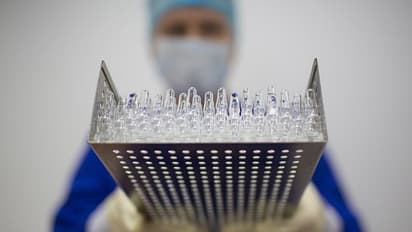US approves emergency use of Regeneron's antibody cocktail for Covid-19 therapy

Synopsis
Clinical evidence from Regeneron's outpatient trials have suggested that monoclonal antibodies such as REGEN-COV2 have the greatest benefit when given early after diagnosis and in patients who have not yet mounted their own immune response or who have high viral load.
The US Food and Drug Administration has approved the emergency use of Regeneron's investigational antibody cocktail to treat mild to moderate COVID-19 in certain high-risk patients 12 years and older.
The antibody cocktail of casirivimab and imdevimab administered together (also known as REGEN-COV2) can now be used for patients at high risk for progressing to severe COVID-19 and/or hospitalization.
Under the Emergency Use Authorisation, the recommended dose is 1,200 mg of casirivimab and 1,200 mg of imdevimab (2,400 mg total) administered as a single intravenous infusion.
The authorisation is temporary and does not take the place of a formal biologics license application submission review and approval process. Casirivimab and imdevimab have not been approved by FDA and remain investigational.
Clinical evidence from Regeneron's outpatient trials have suggested that monoclonal antibodies such as REGEN-COV2 have the greatest benefit when given early after diagnosis and in patients who have not yet mounted their own immune response or who have high viral load.
Leonard S Schleifer, President and CEO of Regeneron, said: This FDA Emergency Use Authorization is an important step in the fight against COVID-19, as high-risk patients in the United States will have access to a promising therapy early in the course of their infection."
"REGEN-COV2 is designed to mimic what a well-functioning immune system does by using very potent antibodies to neutralize the virus," said Dr George D Yancopoulos, President and Chief Scientific Officer of Regeneron.
Dr Yancopoulos further said: "Data from approximately 800 non-hospitalised patients showed significant reductions in virus levels within days of receiving REGEN-COV2, which were associated with significantly fewer medical visits. This benefit was greatest in patients most at risk for poor outcomes due to high viral load, ineffective immune response at baseline or pre-existing risk factors."
"We are encouraged that no variants resistant to the cocktail were identified in the clinical trial analyses to date, which is consistent with our preclinical findings. We are also very encouraged by recently announced promising vaccine results; however, there remains a need to treat patients who develop COVID-19, especially as some may not have had access to or were not protected by vaccination."